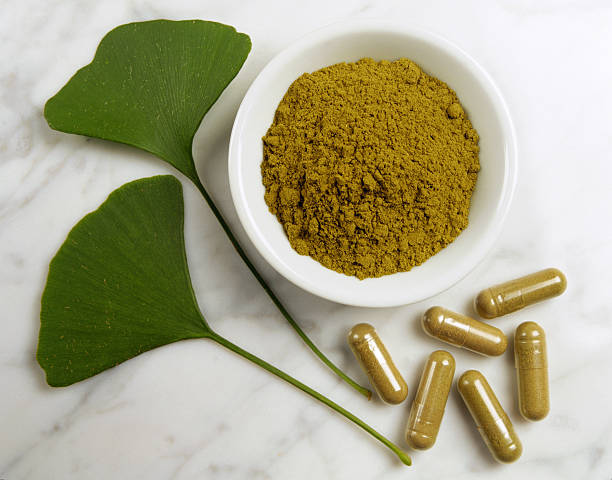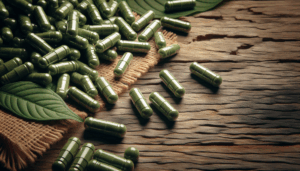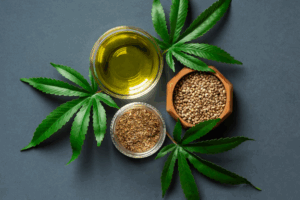Trainwreck Kratom: What It Is & Why People Love It
If you’ve explored the world of kratom, you’ve probably come across Trainwreck Kratom — a name that’s bold, a little mysterious, and often mentioned by

Are you looking to harness the power of nature to elevate your wellness journey? Then, meet with Ashwagandha and kratom plants. Like characters from an ancient herbal saga, Kratom and Ashwagandha emerge from the lush landscapes of Southeast Asia and the arid plains of India, each with its unique tale of wellness potential. Ashwagandha, a cornerstone of Ayurvedic medicine, and Kratom, a Southeast Asian plant, have garnered immense interest due to their potential benefits. In this blog, we delve into the rich tapestry of Ashwagandha benefits, compare it with Kratom, explore the historical purpose of Kratom, and uncover the intriguing intersection of Ashwagandha and Kratom.
Ashwagandha, scientifically known as Withania somnifera, is a revered herb in Ayurveda, often hailed as the “Indian Ginseng”. Research suggests that Ashwagandha may help reduce cortisol levels, the hormone associated with stress, thereby promoting wellness.
Moreover, Ashwagandha exhibits strong antioxidant properties, combating oxidative stress and protecting cells from damage caused by free radicals. This antioxidant activity contributes to its anti-aging properties and potential in preventing chronic diseases.
Ashwagandha is also celebrated for its immune-boosting properties. Recent Studies indicate that it may enhance immune function by increasing the activity of immune cells, thereby fortifying the body’s defense against infections and illnesses.
Despite being indigenous to Southeast Asia, Kratom’s historical significance extends beyond its native region. Kratom capsules offer an excellent introduction to Kratom, catering to customers for enhancing well-being. Each capsule typically holds around 0.950 grams of powdered Kratom.
Explore a diverse selection of Kratom capsules including red-vein, green-vein, white-vein, yellow-vein, and artisanal blends, encapsulated for wellness purposes.
Discover Club13 Herbals unrivaled Kratom capsules, rigorously tested by independent third parties to uphold our highest standards. We source premium, globally sourced, all-natural ingredients to craft a spectrum of strains, ensuring wellness. Look at some of the best ones here ->
1) Maeng Da Red Capsules: Maeng Da Red Kratom is a type of kratom known for its strength and wellness. The “Red” refers to the vein color of the kratom leaves used, which typically indicates a more mature leaf.
2) Indo White Kratom Capsules: Indo White Kratom comes from the leaves of kratom trees grown in Indonesia. The “White” designation signifies the color of the veins in the leaves. White indo kratom is generally associated with the best well-being properties.
3) Bali Red Kratom Capsules: Bali Red Kratom is one of the most well-known and widely available kratom strains. It originates from kratom trees grown in Bali, Indonesia. The “Red” vein variety is known for its wellness properties.
4) Maeng Da Green Capsules: Similar to Maeng Da Red, Maeng Da Green Kratom is also known for its high strength and wellness. The “Green” designation indicates that the leaves used have green veins.
5) Green Malay Kratom Capsules: Green Malay Kratom comes from Malaysia and is known for its long-lasting benefits. The “Green” vein variety is prized for its well-being properties.
While Ashwagandha and Kratom share certain similarities in their traditional benefits, they differ significantly in their properties. Let’s understand it through the below table:
| Properties | Kratom | Ashwagandha |
| Botanical Name | Mitragyna Speciosa | Withania Somnifera |
| Plant Family | Rubiaceae (Coffee Family) | Solanaceae (Tomato Family) |
| Part Used | Leaves | Roots |
| Active Ingredients | Mitragynine & Related Alkaloids | Withanolides (Alkaloids) |
| Origin | Southeast Asia | Indian Subcontinent |
| Legality | Legal in most places | Legal worldwide |
Ashwagandha benefits primarily as an adaptogen, promoting stress resilience and overall well-being. Its properties are more subtle and supportive, aiming to restore balance and harmony within the body.
In contrast, Kratom, scientifically known as Mitragyna speciosa, is recognized for its wellness properties. It contains alkaloids such as mitragynine and 7-hydroxy mitragynine, to elevate well-being.
While both Ashwagandha and Kratom offer potential benefits, it’s essential to acknowledge their distinct mechanisms of action and intended functions.
Read more: Essential Insights on Ashwagandha and Kratom: 9 Key Facts to Consider
The legality of Ashwagandha and Kratom varies depending on the country and sometimes even within regions of a country. Here’s a general overview:
It’s crucial to note that the legal status of these substances can change, so it’s always a good idea to verify the current regulations in your locality or country.
Pro tip: Is Kratom Legal in South Carolina? Kratom Challenges and Advocacy
Throughout history, Ashwagandha and kratom have played significant roles in offering wellness. Ashwagandha is readily available in most health stores, offering a convenient option for those seeking its potential benefits. For kratom enthusiasts, ensuring safety is paramount; sourcing quality-tested kratom from reputable online vendors is advisable.
Explore Club 13 Herbals’ exceptional Kratom products! Whether you prefer the convenience of capsules or the versatility of powders, our carefully crafted selections cater to every preference and need. At Club 13, we uphold the highest standards of quality and purity, ensuring that each product delivers the premium Kratom experience you deserve. With a commitment to excellence and customer satisfaction, discover our extensive range of Kratom offerings and elevate your wellness journey today.
Ashwagandha falls under the category of herbal products, which are not subject to FDA approval.
Despite Danish alerts about Ashwagandha products being sold through Danish, UK, and German websites, Ashwagandha is authorized for sale in both the UK and Germany.
The legal status of kratom varies by country and jurisdiction. In some places, kratom is classified as a controlled substance, while in others, it is legal for personal use. It’s important to research and understand the laws regarding kratom in your location before purchasing it.
Kratom capsules are available for purchase from various online vendors, specialty stores, and some wellness shops. It’s essential to buy from reputable sources that provide high-quality and lab-tested products about their sourcing and manufacturing processes.
Ashwagandha is believed to support adrenal function, which plays a role in energy production and regulation. By supporting healthy adrenal function, Ashwagandha may help boost energy levels and reduce fatigue.
References:
1) An Overview on Ashwagandha: Narendra Singh, Mohit Bhalla doi: 10.4314/ajtcam.v8i5S.9 PMID: 22754076
2) Ashwagandha (Withania somnifera)—Current Research on the Health-Promoting Activities: Beata Nowak, Academic Editor and Sylwia Zielińska doi: 10.3390/pharmaceutics15041057 PMID: 37111543
If you’ve explored the world of kratom, you’ve probably come across Trainwreck Kratom — a name that’s bold, a little mysterious, and often mentioned by

What Is Kratom Seltzer? Everything You Need to Know Move over, hard seltzers — a new kind of botanical brew is making waves. Kratom seltzer

Top 7 Kratom Capsules That Work (And Where to Get Them) With the growing number of kratom brands entering the market, finding quality capsules you
Why Red Maeng Da Kratom Is the #1 Choice for Daily Buyers In the world of kratom, Red Maeng Da is one of the most

Plants like Kratom and CBD have received significant attention in recent years for their potential to improve overall wellness. As these two substances continue to